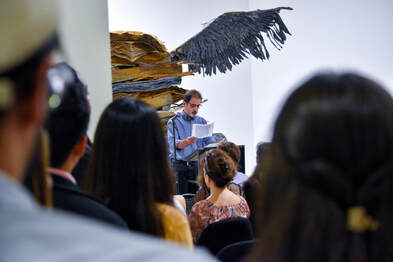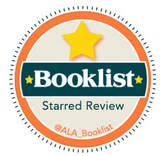 What was the inspiration for your piece? What compelled you to write it? That’s a good question! I can’t really say, to be honest. I do know the poem surprised me with its sudden clarity and shifts in perspective, and I do know I was intrigued by the fact that I didn’t fully understand its situation but instead saw the scene—and the woman—with striking vividness and an ache of truth. For many years, my writing-practice has entailed a few hours at the computer every morning, before I do anything else (except drink coffee), trying to capture something—some line or image or phrase—I can run with, so to speak, without “thinking,” until—if I’m lucky—I arrive somewhere that feels authentic. If I’m working in poetry, this process entails following that initial impulse within the limitations the line—its cadence mostly--imposes on my choices; if I’m working in prose, the limitations are the less rigorous impositions of the sentence and its syntax. I find that the limitations I impose upon myself are directly related to the discoveries I make. “Sky” felt immediately real to me because those discoveries felt new—to me and perhaps to others, too—and thus worth shaping and crafting. As far as possible, I try never to know what I’m going to write before I begin the process. So I guess, to (finally) answer your question: Though I must have been aching somewhere for people who have been lost, abused and abandoned as the woman in this poem is, the process itself was the poem’s inspiration. What compelled you to submit your work for this anthology? Was it a difficult decision? It’s been a while since I submitted the poem, but I suspect that, when I saw the call, I thought, maybe that “Sky” poem would sing for them. I’m glad it did, since at that point I had no idea whether the poem was any “good” or not—that is, I didn’t know whether it would communicate to someone other than myself. I don’t think it was a difficult decision, since part of the process of being a writer, and particularly a poet, is to send one’s work out into the world and hope it will make some connection. Of course it’s always gratifying to have one’s work accepted for publication; the difficulty, I think, comes with the fact that the majority of one’s poems—the vast majority, I think—will be turned down by prospective publishers, often many times. Every poet has experienced this, and it can be hard to believe in the value of one’s work, sometimes, in the face of that vast disinterest. So it takes a certain courage to submit! But as I said above, that’s integral to the process of writing with serious intent. Why did you choose this particular form or genre for this piece? Since I most often work in lyric poetry—that is to say, in small forms in which the line is determined by breath and cadence--it was natural for me to choose this form for the poem. Unlike many of my poems whose form is determined by a loose-form free verse, “Sky” is really a poem whose form was discovered in the breath, that is, in the rhythm of breath rather than heartbeat or some other more regular measure. This looser form allowed me to “leap” from scene to scene with greater ease than might have been possible had I used a tighter form, and I think (hope) it gave a certain openness to the poem’s overall feeling—particularly in the leap that leads to the last line. Can you speak to the evolution of writing your piece? How long did it take you to write this piece, including revision? As I remember, this poem came almost fully-formed in its first draft. Of course I revised, but that revision consisted mostly of listening carefully to the line breaks and the white spaces, to make sure I got the poem’s breath right, rather than the kind of “re-vision” in which the poem is cracked open and put back together in order to get to its marrow. To really read, really enter, any poem, one must breathe with the breath of the poet who wrote that poem. For the poet making a poem, capturing that breath can be an extremely difficult task, particularly in an open-form poem such as “Sky.” So part of the revision process consists of reading and rereading, listening carefully, making small adjustments and reading again—until all the moments in the poem are properly balanced and the marks that indicate that balance—line break, punctuation, white space—are organized precisely to hold the breath in place. As a writer, do you feel obliged to share difficult experiences? “Obliged” feels like the wrong word here, since I don’t feel “obliged” to do anything in writing except follow the paths that open themselves to me. Having said that, it’s a general understanding, I think, that writers and particularly poets are often drawn to writing precisely because difficult experiences have shaped a need to “say the unsayable,” to communicate what ultimately lies beyond language. I think this is largely true, certainly early in a writer’s development. And as I think more about your question, I realize that I can’t imagine a writer not drawn to exploring—and sharing--difficult experiences! The real question, I think, has to do with whether the writer locates herself only in her own difficult experiences or whether she’s able to find the means of opening herself to the suffering (and joys) of others. Perhaps a good writer starts in the first of these impulses and opens herself to the second. Furthermore, perhaps one quality we’re looking for in the best of writers is that empathic imagination by which the world is made larger. One wonders what discoveries we might make if we were able to open ourselves to the difficult experiences of all the world’s creatures, not only those of our fellow humans! What would you say to another writer who has been uncomfortable or silent about their experience? How can they begin to share their experiences? I think that a great deal of the best writing comes when a writer finds the courage to wrestle with those most uncomfortable of experiences. In fact, in many cases, that’s where we start; the very fact that one is drawn to writing brings music into that silence. I would try to get that uncomfortable writer to see that writing is a process of discovery, of digging deeper, and that by engaging in the process one might find a kind of healing, or at the very least a deeper response to that suffering, a way through it by digging down. I would also suggest that she find a community of other writers—people she trusts not to judge but to respond honestly—to read her work. Likewise, her response to the work of fellow writers drafts would empower her to greater confidence and sense of community. And the connection community provides—whether of friends, colleagues, fellow practitioners or readers whom we’ll never meet, is, after all, the point. Art makes the world larger to the extent that it forges community. How can a publication such as Grabbed help to empower or heal readers? The realization that we are not alone even in our aloness or solitude may itself be a source of healing. Reading about difficult experiences can be a source of greater empathy—toward others and toward oneself. Experiencing writers who have somehow found the courage to communicate difficult experiences in vivid, honest language, can give people the wherewithal to find that courage in themselves. On the most basic level, this act of sharing may give us the sense that we are less alone than we think. Again, it’s that sense of sharing and community. Michael Hettich was born in Brooklyn, NY, and grew up in New York City and its suburbs. He has lived in upstate New York, Colorado, Northern Florida, Vermont, Miami, and Black Mountain, North Carolina, where he now lives with his wife, Colleen. He has published over a dozen books of poetry and an equal number of chapbooks. His work has appeared widely in journals and anthologies. His most recent book of poems, To Start an Orchard, was published by Press 53 in 2019. Michael Hettich’s awards include several Florida Individual Artists Fellowships, a Florida Book Award, The Tampa Review Prize in Poetry, and the David Martinson–Meadow Hawk Prize, among others. He often collaborates with visual artists, musicians, and fellow writers. Hettich holds a Ph.D. in English and American literature from the University of Miami. For many years, he taught creative writing, composition and literature at Miami Dade College where he was honored with an Endowed Teaching Chair in Environmental Ethics. He has two grown children, Matthew and Caitlin, and a grandson, Owen Sharpe. His website is michaelhettich.com.
0 Comments
Leave a Reply. |
Grabbed BlogHave a blog idea for us? Submit it here. Archives
October 2020
Categories |
|
BUY GRABBED
|
If you or anyone you know is a victim of domestic violence, please call The National Domestic Violence Hotline: 1-800-799-7233 1-800-787-3224 (TTY) En Español: 1.800.799.7233 |
 RSS Feed
RSS Feed







